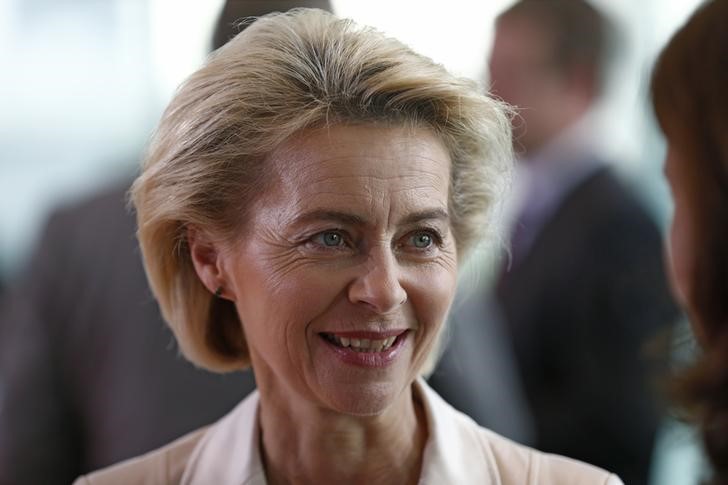(Bloomberg) -- Ursula von der Leyen of Germany won confirmation as the next president of the European Commission, becoming the first woman set to assume Europe’s most powerful policy-making post.
The German defense minister received the European Parliament’s endorsement on Tuesday to succeed Jean-Claude Juncker of Luxembourg after pledging to spur investment through bolder climate policies. The verdict means a job held for the past 15 years by the continent’s Christian Democratic party, a traditional backer of open markets, will stay in its hands for the next five.
The European Union assembly voted 383 to 327 in Strasbourg, France, to make von der Leyen commission chief starting Nov. 1, averting a confrontation with EU national leaders who unexpectedly tapped her two weeks ago after being deadlocked over official candidates fielded by the bloc’s main political families.
“Our most pressing challenge is keeping our planet healthy,” von der Leyen, an ally of German Chancellor Angel Merkel, told the EU Parliament before the vote. “This is the greatest responsibility and opportunity of our times.”
Climate Bank
The Brussels-based commission is the 28-nation EU’s executive arm, which proposes and enforces European laws on everything from car emissions to energy pipelines. It also monitors national economies, negotiates trade deals, runs a diplomatic service, manages the bloc’s budget and acts as Europe’s competition authority.
Von der Leyen said Europe’s goal to cut greenhouse gases blamed for global warming by 40% in 2030 compared with 1990 was inadequate and vowed a reduction target as high as 55%. She also pledged to turn parts of the European Investment Bank, the EU’s lending arm, into a “climate bank” in a bid to unlock 1 trillion euros of investment ($1.12 trillion) over the coming decade.
On commerce, von der Leyen warned about the dangers of protectionism and stressed the need to uphold the multilateral system underpinned by the World Trade Organization. “We defend the rules-based order because we know it is better for all of us,” she said.
Von der Leyen, 60, is the centerpiece of a European top-jobs package that reasserts the authority of the EU’s core countries -- particularly Germany and France -- as the bloc confronts Brexit, U.S. protectionism under President Donald Trump, renewed Russian muscle-flexing and growing Chinese economic heft.
Building Bridges
The package also puts International Monetary Fund Managing Director Christine Lagarde of France in the presidency of the European Central Bank, Belgian Prime Minister Charles Michel in the chair of EU summits and Spanish Foreign Minister Josep Borrell in the bloc’s top diplomatic post. Those three positions are also being vacated later this year.
Von der Leyen will face political constraints from EU national capitals and the bloc’s Parliament as she assembles a team of commissioners over the coming weeks. The commission leadership is made up of one appointee from each member country and the EU Parliament plans to vote on von der Leyen’s whole team in October.
The arduous task that EU government heads had in balancing party, national and geographic interests when negotiating the top-jobs deal will also play out in the formation of the new commission team. That is especially so because of the margin of her victory in the EU Parliament, where she surpassed the absolute-majority threshold needed by just nine votes.
Von der Leyen will become the second German to lead the commission after Walter Hallstein was its first president from 1958 to 1967. Her father was a senior official in Hallstein’s commission and she was born in Brussels and lived there as a child.
“It’s a feeling like coming home for me,” von der Leyen told reporters after the EU Parliament verdict. “I want to unite Europe.”
In her campaign to win over the EU Parliament, she faced opposition from left-of-center groups including the Socialists, who were bitter their official candidate for commission president -- Dutchman Frans Timmermans -- was sidelined by the government chiefs after he gained late momentum.
“These were definitely the most intense two weeks in my political life,” von der Leyen said.
She has sought to build bridges with the Socialists, promising that Timmermans -- currently the commission’s principal vice president -- will retain a beefed-up role.
She has also pledged to try to forge a team in which half the commissioners are women, vowing to ask national capitals to propose one male and one female appointee for her to choose between.
“I will ensure full gender equality in my college of commissioners,” she said. “If member states do not propose enough female commissioners, I will not hesitate to ask for new names.”
(Updates with margin of victory, comments from 11th paragraph.)
